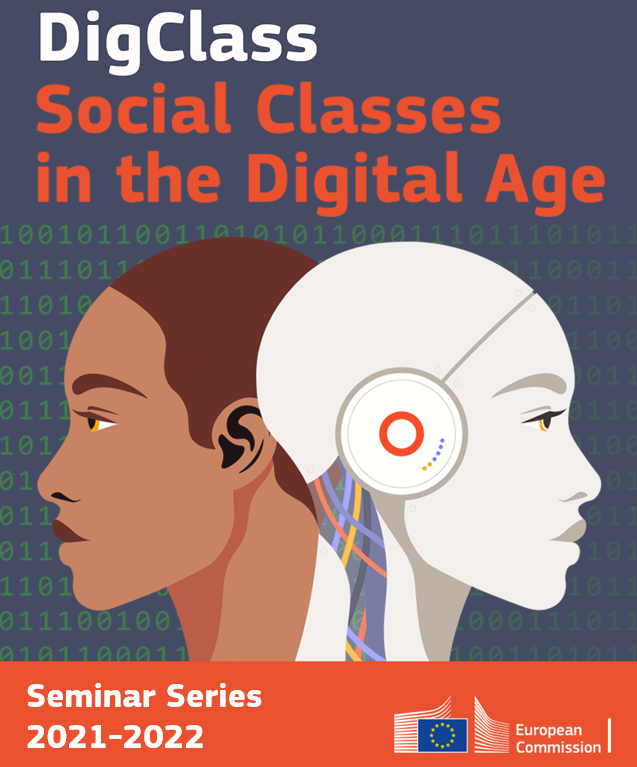- applied sciences | educational reform | labour economics | skills anticipation and matching | reskilling | inclusion | updating of skills | socially disadvantaged class | innovation
- Tuesday 25 January 2022, 16:00 (CET)
Practical information
- When
- Tuesday 25 January 2022, 16:00 (CET)
- Languages
- English
- Social media links
Description

The fourth session of the DIGCLASS seminar series on rising income inequality and polarisation will take place next Tuesday, January 25th from 15.00 to 16.00 (CET) in an open-access online format. Below you can find all the details and the link to the session.
Background
The DIGCLASS seminar series is expected to facilitate the exchange of cutting-edge ideas and debates related to social inequality, labour economics and political economy between JRC researchers and beyond by attracting external scholars, policy-makers and a general audience.
Visit the DIGCLASS website to check the full programme!
Drop us a line at JRC-CAS-DIGCLASS ec [dot] europa [dot] eu (JRC-CAS-DIGCLASS[at]ec[dot]europa[dot]eu) if you want to stay tuned with our seminar series and other activities.
ec [dot] europa [dot] eu (JRC-CAS-DIGCLASS[at]ec[dot]europa[dot]eu) if you want to stay tuned with our seminar series and other activities.
Title
Rising inequality as a political problem: Is there a negative effect of rising inequality on democratic trust, and if so, why?
Abstract
To many citizens and political observers alike, it is self-evident that inequality is corrosive to society. Indeed, anyone interested may readily turn to acclaimed popular treatises like Wilkinson/Pickett’s “The Spirit Level” to learn that economic inequality is correlated with a whole plethora of social ills, and that the authors attribute this correlation to a pathological degree of status competition in unequal societies. In this presentation, I will show first that a Spirit-Level-type relationship also applies in the case of citizens’ trust in democratic institutions, but will then walk the audience through a series of empirical analyses that use survey data from the European Social Survey and the General Social Survey to probe deeper for its analytical interpretation. In my reading of the evidence, rising economic inequality does mildly depress political trust, yet in a way that is not primarily motivated by status anxiety but is instead consistent with a standard trust-as-evaluation model where mitigating economic inequality is one element (but perhaps not even a dominant one) in the political preferences of left-leaning citizens.
Speaker
Markus Ganglis Professor of Sociology at the Department of Social Sciences, Goethe-University Frankfurt am Main, and Honorary Fellow at the Department of Sociology at the University of Wisconsin-Madison, USA. His main fields of research are social stratification, economic inequality, social mobility, labor markets, and statistical methods for the analysis of social science data. Markus Gangl has published extensively in international peer-reviewed journals, is an elected member of the German National Academy of Sciences (Leopoldina), and serves as the current Editor-in-Chief of the European Sociological Review. He also is the principal investigator in the ERC-funded POLAR project, which investigates the societal impact of rising economic inequality in affluent countries. The presentation in the DIGCLASS Seminar Series will feature selected first results from the POLAR project
Link to the recorded session
https://webcast.ec.europa.eu/rising-income-inequality-and-polarisation-in-the-eu-2022-01-25
Related Content
Venue
Online, EU
